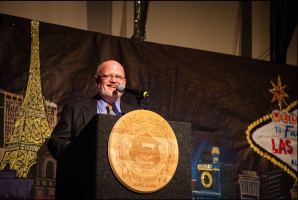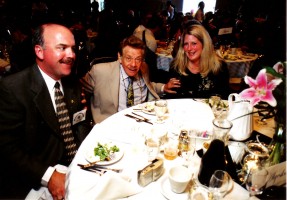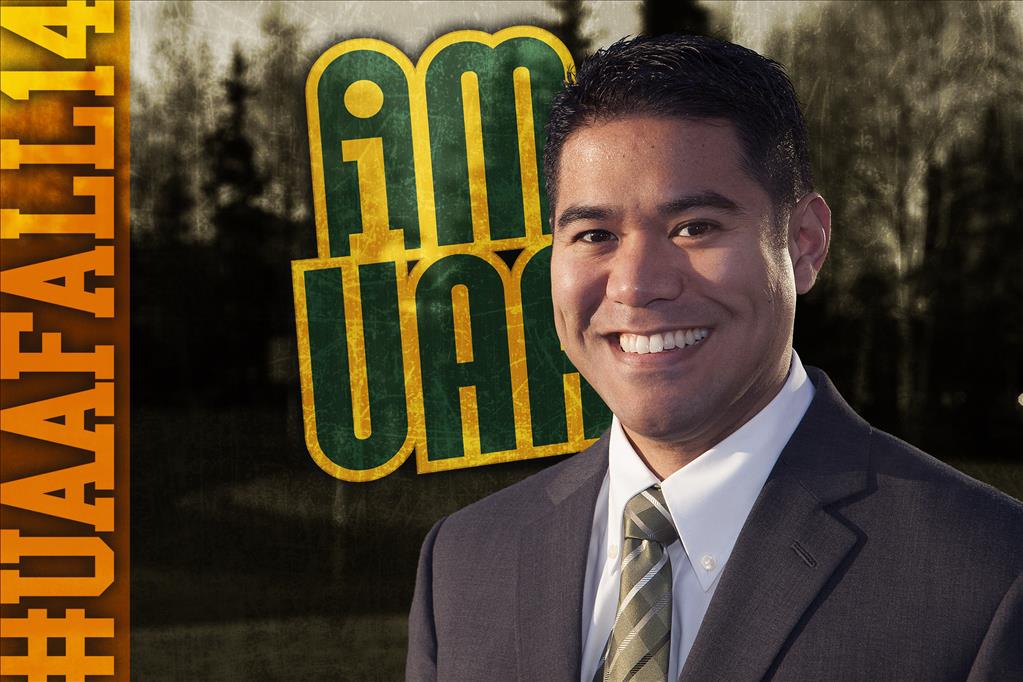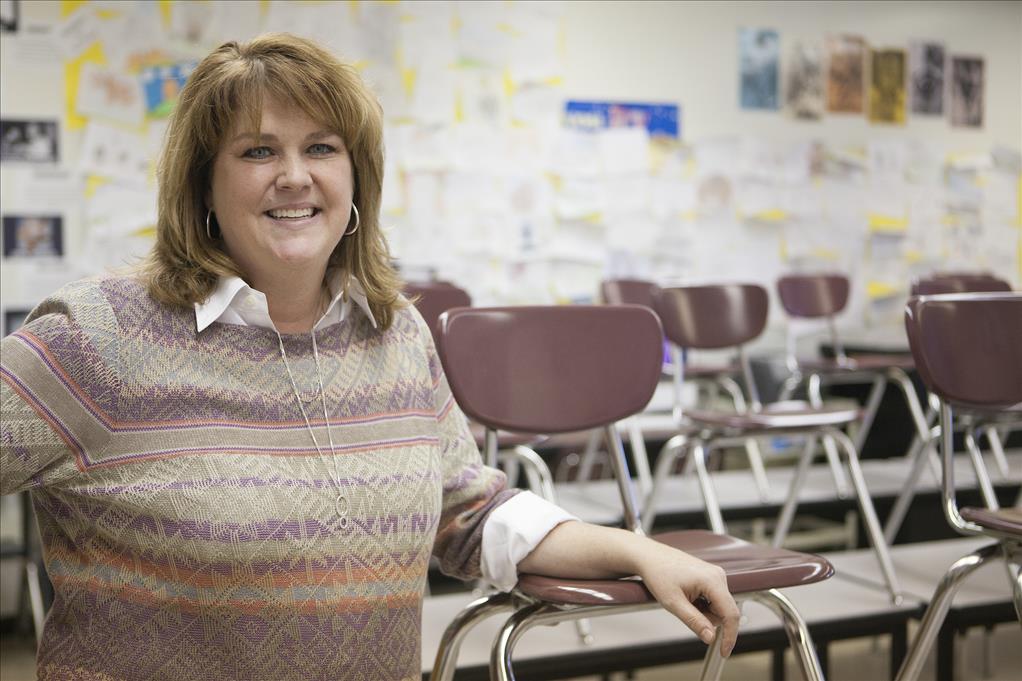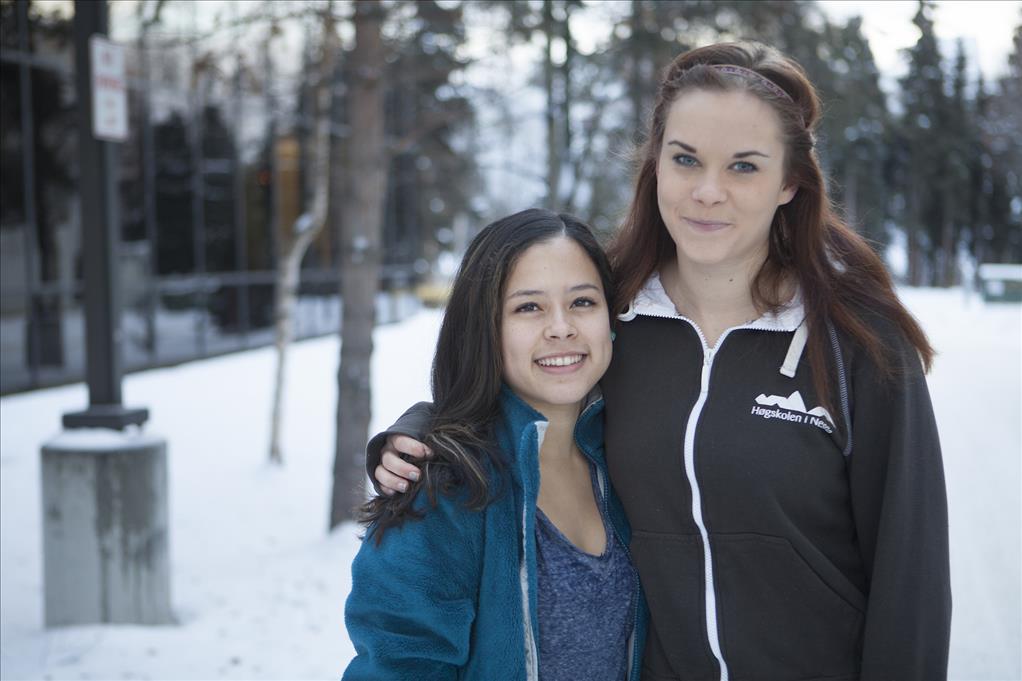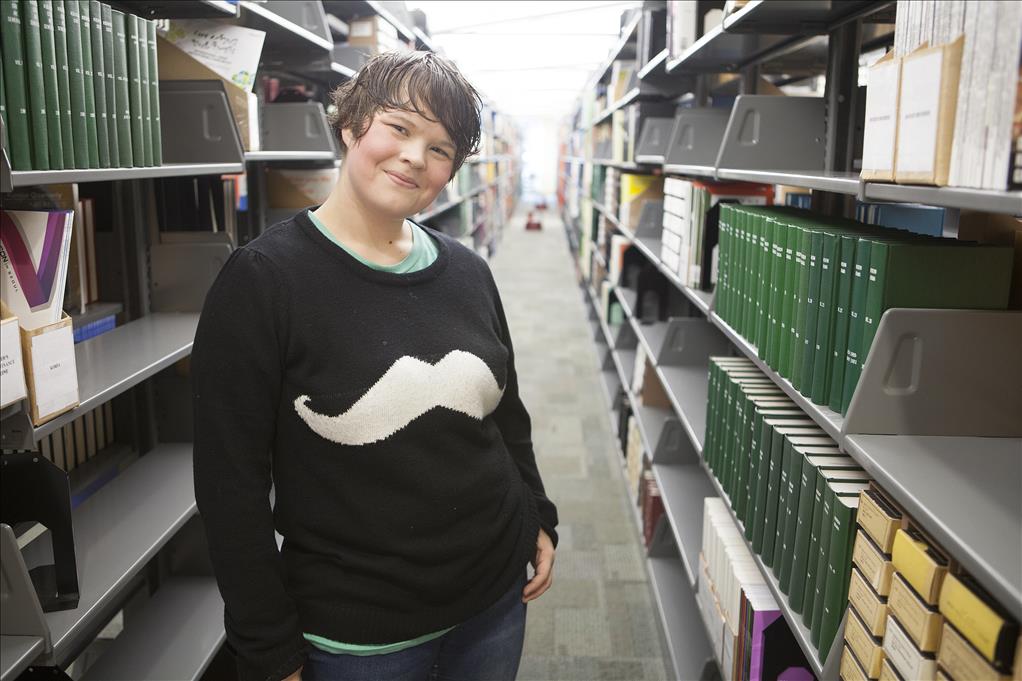Theatre on the Last Frontier
by joey |
Valdez, Alaska will have a bit of a population spike this week as actors, writers, designers and everyone's favorite telegraph operator from Dr. Quinn, Medicine Woman descend on the small coastal fishing town. It's time for the Last Frontier Theatre Conference (LFTC).
LFTC is an annual workshop hosted by Prince William Sound Community College (PWSCC)-a sister college to UAA. The conference first started in 1993 as a three-day event aimed at gaining national recognition for theatre in Alaska. The event honored and hosted world-class playwrights-most notably, Arthur Miller (Death of a Salesman, The Crucible) in 1996-and winners of every award worth its dramaturgical salt: Tonys, Emmys, Pulitzers, Guggenheim fellowships and Rockefeller grants included.
Coordinating on the Last Frontier
Dawson Moore has helmed the weeklong conference since 2003, and has overseen the conference's shift from celebrating the past towards developing the future. The early conference, he said, employed "a dual split focus between honoring titans of the theatre and doing a craft workshop." Now, the focus is all on supporting the next set of Arthur Millers.
"We've turned it into much more of a pure craft workshop," he explained. "The most important thing we do is connect artists with each other."
Dawson, who graduated from UAA with a B.A in theatre in 1997, has been attending LFTC since his college days. He's now an adjunct instructor in theatre at PWSCC.
He attended his first conference to take part in the Play Lab, the conference's signature workshop where playwrights test their work before a panel of established theatre community members. Dawson says he prepared to dazzle the theatre elites, but quickly realized his misconceptions. "I really wasn't one of their peers," he laughed, "and I had a lot to learn."
Despite the tough love, he continued returning to improve his craft. "I kept rearranging my schedule every year to come back and, if you do that long enough, eventually they'll hire you," he joked. He started as a Play Lab panelist in 2002, and stepped up to theatre conference coordinator in 2003. He remains in the position today, corralling playwrights, reviewing scripts, scheduling catering, assigning actors, organizing the conference's annual harbor cruise for participants and maybe sometimes setting up tents as overflow actor housing on the floor of the Valdez gym.
Inside the Play Lab
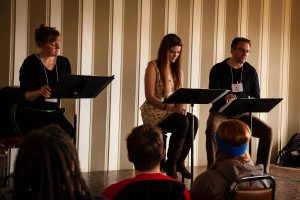
LA-actress/playwright Amy Tofte, UAA student Taylor Campbell, and UAA grad Aaron Wiseman reading The Calm by Fairbanks playwright Carey Seward.
The bulk of the conference schedule is reserved for the Play Lab, a showcase of juried selections. This year, the event will feature 44 original plays culled from a record 397 international submissions. Each reading debuts over the span of seven days, with several plays taking the stage simultaneously throughout the Valdez Civic Center.
A variety of factors affect whether a play makes the cut for the conference. "The first factor is always quality," Dawson explained. The conference's remote location serves as extra motivation to attract top-notch material; "People here need to feel like they're participating in good work and see plays that are obviously high caliber," Dawson explained, "If they don't, it calls into question, 'Why did we come this far?'"
Dawson's developed a wide network of playwrights, and he weighs submissions against each writer's earlier work as well. If he believes a writer has taken a creative step backwards, their submission is less likely to be accepted.
True to the original intent of the conference, he also says there's a bit of a bias towards Alaska writers. "We want to encourage the writers inside of our state to participate," he said.
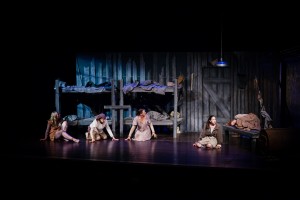
The 2013 conference presentation of A Gulag Mouse by new Anchorage theatre company Tosspot Productions.
He holds a lot of sway over the annual playbill, but variety is one last consideration. "We don't want to stage an evening of what Dawson likes best," he said, admitting that would generally include only the bawdiest scripts. Instead, the conference panel tries to represent "everything under the sun."
Each reading debuts before an audience of die-hard theatre buffs and casual visitors, as every work in the Play Lab is open to the public. Panelists weigh in on the script following the performance, and every playwright receives a one-on-one conversation with a panelist about their work.
Every stage needs an actor, and over a hundred arrive in Valdez each June to join the show (Dawson estimates 75 percent of actors return year after year). Actors receive scripts in advance but, due to the packed pace of the conference, each cast can only assemble once before the reading, meeting the playwright and staging the first (and only) rehearsal the day before the premiere. It's a high-wire act in a non-stop environment. And, oh yes, some actors are cast in up to five shows.
Non-stop theatre
The Play Lab is the heart and soul of the conference, but its one of many programs throughout the week.
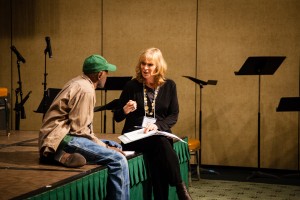
Anchorage actor Henry Weaver works with LA-based acting teacher Laura Gardner in the 2013 Monologue Workshop.
Actors receive mentorship from acting coaches in the monologue workshop, where they perform a monologue prepared by that year's playwrights. Acting coaches vary by year, but oftentimes arrive in Valdez from the showbiz cities of Los Angeles and New York. This year's coaches are long-time conference contributors Laura Gardner and Frank Collison, each with long careers on stage and on camera (for those fans of Dr. Quinn, Medicine Woman out there, Frank played the bumbling telegraph operator on the mid-90s family drama).
After the official conference ends for the day, everyone wanders to the Fringe Festival, composed of new work written by anyone wishing to participate. "In the Fringe we have funny writers who write funny things," said Dawson, mentioning the plays adopt a much more adult tone in the after-hours venue. The Fringe first started in 1998, jumping restaurants and venues around town. This year, the Fat Mermaid plays host and, like last year, a packed house is expected every night of the week.
As if that's not enough theatre for only seven days, there's also the evening theatre series, featuring polished plays from established theatre companies and university programs, including UAA's Theatre on the Rocks.
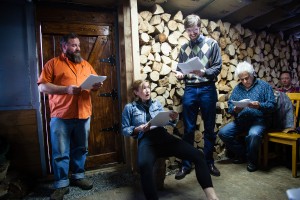
Actors in the Fringe Festival at the Fat Mermaid in Valdez (from L to R. Jon Lang, Annie McCain Engman, Max Arons, Mark Muro).
Among this year's evening theatre series is Unanswered, We Ride by Jaclyn Villano. The play was first read in the Play Lab in 2010, where it caught the attention of actress Joy Barrett. "She fell in love with it and took it to New York with her," Dawson said. The production has since shown at the Edinburg Fringe Festival (the world's largest arts festival, held annually in Scotland's capital city) and in theatres throughout the USA. Its final performance will be in Valdez on Wednesday, June 11 at 8 p.m.
It takes a year to prepare and only a week to complete, but Dawson thoroughly enjoys his role as coordinator of the annual conference. The rest of the summer teaching theatre classes at PWSCC is a bit of a breeze after the conference winds down.
"During the conference, I'm up from 7:30 a.m. to 11 p.m or 4 a.m. or whenever I finish the evening. You know what looks like nothing after that? 8 hours at a desk," he laughed.
The Last Frontier Theatre Conference continues through June 14 in Valdez.
Please visit the conference's exceptionally informative website to learn more about the event.
All photos courtesy of Last Frontier Theatre Conference
 "Theatre on the Last Frontier" is licensed under a Creative Commons Attribution-NonCommercial 4.0 International License.
"Theatre on the Last Frontier" is licensed under a Creative Commons Attribution-NonCommercial 4.0 International License.










